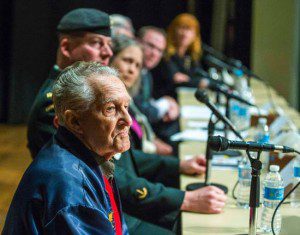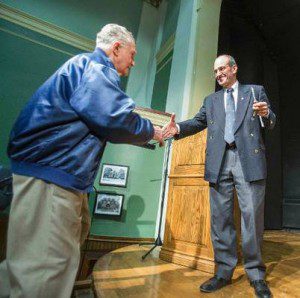
Up until last April, the council chamber in one Quebec community would generally fill with reporters and interested members of the public. When it was time to commence the town of Saguenay’s business, in would flow the members of council to take their spots. Then, before a single piece of business was addressed that day, someone would recite these words:
“O God, eternal and almighty, from Whom all power and wisdom flow, we are assembled here in Your presence to ensure the good of our city and its prosperity…”
The prayer would go on for several more lines, seeking the deity’s blessing prior the council’s proceedings. Well, as I say, that ended in April. After many months of debate and legal action, that went all the way to the Supreme Court of Canada, the nine learned judges decided that reciting such a prayer was “in breach of the state’s duty of neutrality.”
In other words, by reciting a Christian prayer, Saguenay Council was excluding citizens from other religions, or in fact had “turned the meetings into a preferential space for people with theistic beliefs,” the court said. Clearly, in as diverse a society as Canada has become, this is not the way to start a meeting nowadays.
That’s not to say that launching proceedings cannot offer inspiration. I recall at my high school in east-end Toronto, the day began with the janitor raising the Canadian Maple Leaf flag during the playing (over the PA system) of ‘O Canada’ and then a series of announcements from the principal or VP about the day’s events.
Indeed, when I was in Grade 12, a number of us at Agincourt Collegiate actually convinced the VP that students should organize and deliver the daily announcements; we pre-recorded dramatic or comedic sketches on audio tape to promote dances, fundraisers and sports events. We even did parodies of the VP and teachers; sometimes they bordered on bad taste, but remember, it was the 1960s. We didn’t care. It was a great way to launch the day’s schedule with a bang.
Over the years I’ve attended a number of service club meetings. Unlike the Saguenay Council example, the service groups declare their inclusiveness when they begin a meeting. They generally open their sessions by reminding members what’s common among them. Whether it’s the Lions offering their motto “We serve,” or the Rotarians saying “He profits most who serves best,” or the Optimists entreating members to “Bring out the best in kids,” or Probus Club members professing “Our strength is fellowship, our success is participation,” it’s all about what bonds people of like minds together.
Then, there was the meeting I moderated about five weeks ago. Some of you may recall the situation that arose in Stratford, Ont., where the local district school board had ruled against a local high school history teacher, Rick Boon, who wanted to take unpaid leave to join his veteran father Art overseas in ceremonies marking the 70th anniversary of Dutch Liberation in 1945. I hadn’t expected to be involved in the confrontation between the Boons and that board. But that’s when I got a phone call from Loreena McKennitt, the renowned Celtic performer who resides in Stratford.
“I need you to moderate a discussion on this issue,” she told me.
After a long conversation, I agreed. Overnight I studied up on both sides of the dispute and the next day drove to Stratford to MC a panel discussion at Stratford Town Hall. We’d managed to get a couple of the school board trustees to agree to appear. We’d also included in the panel: Loreen McKennitt who’d led the campaign for the board to reverse its position; a lawyer to talk about school board policy; a military historian to offer background on Canada’s relations with veterans; and Art Boon, the veteran whose son the board had refused to allow to travel with him.
You can imagine the tension in that hall. The trustees thought they were targets. The other panellists seemed very nervous. And it felt as if the audience was out for blood.

Me? I just wanted to keep the lid on things and allow everybody a chance to speak. Anyway, as the panel and I walked to the stage for the beginning of the meeting, in unison everybody in the hall stood up. The panellists positioned themselves behind their chairs on stage. And everybody stood there waiting for the meeting to begin. I went to the microphone.
“With everybody standing like this,” I said, “I feel as if we should start by singing ‘O Canada.’”
That’s exactly what happened. Led by panellist and performer Loreena McKennitt, we sang the national anthem. It seemed to cut through the tension and got the meeting underway without incident. It made me think maybe all meetings – municipal councils, school classrooms or service club assemblies – should start with some singing, something to bring people together in a kind of collective, audible sigh … before getting down to business.